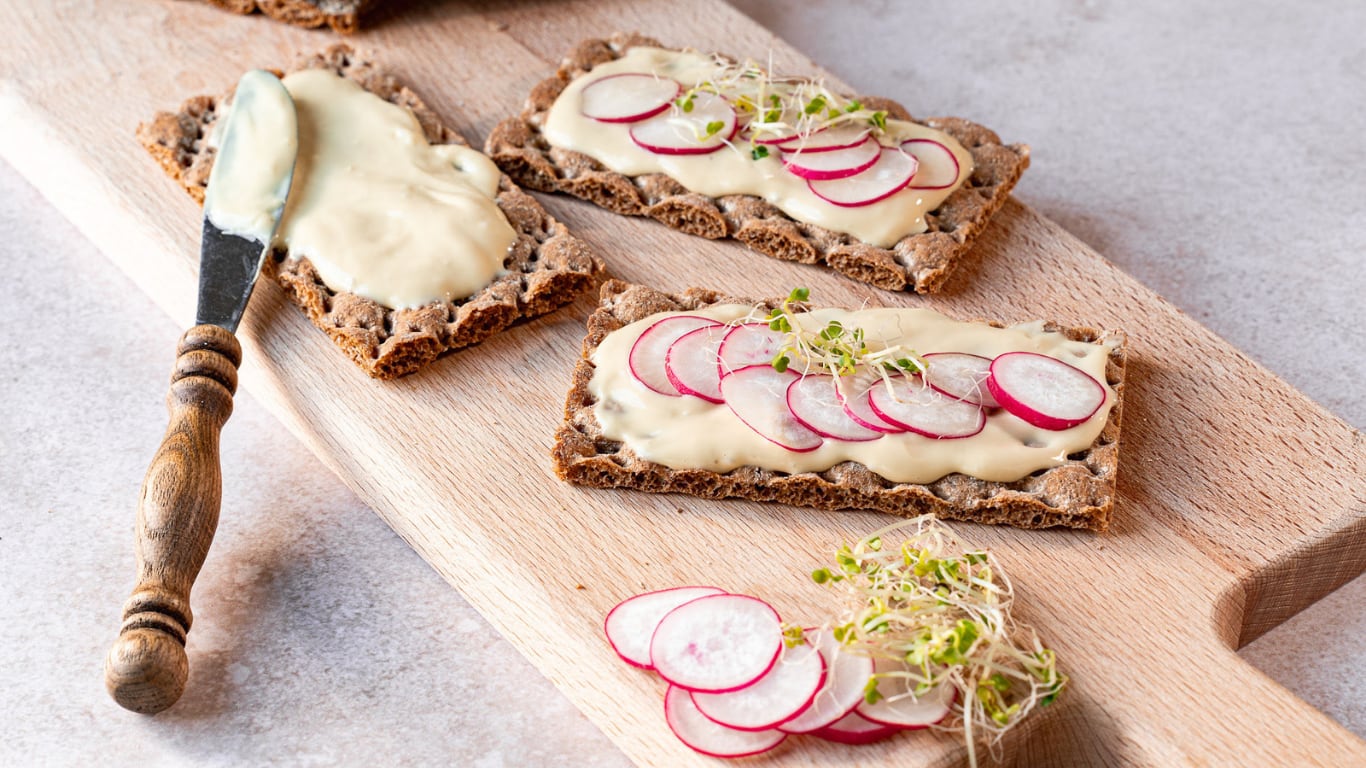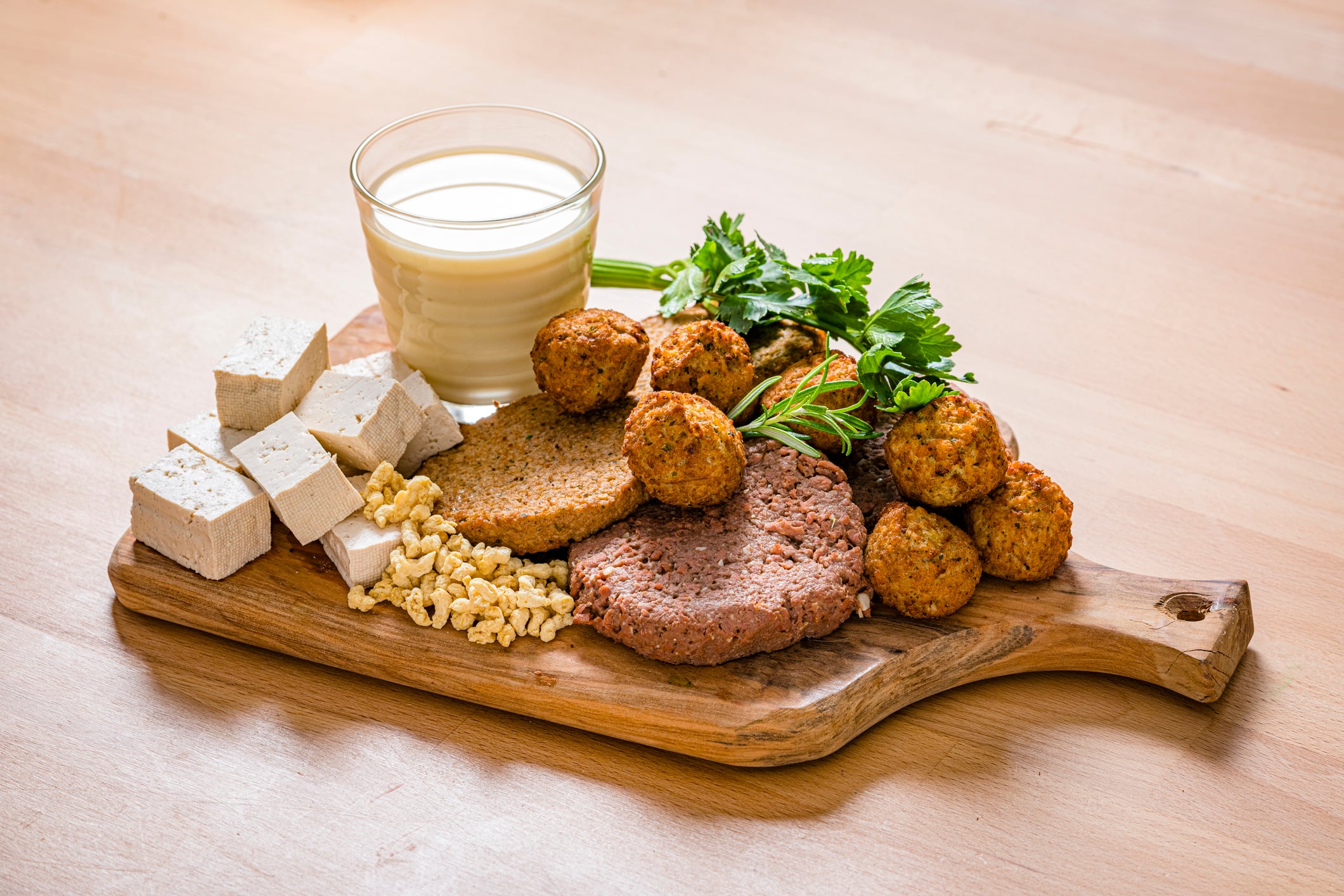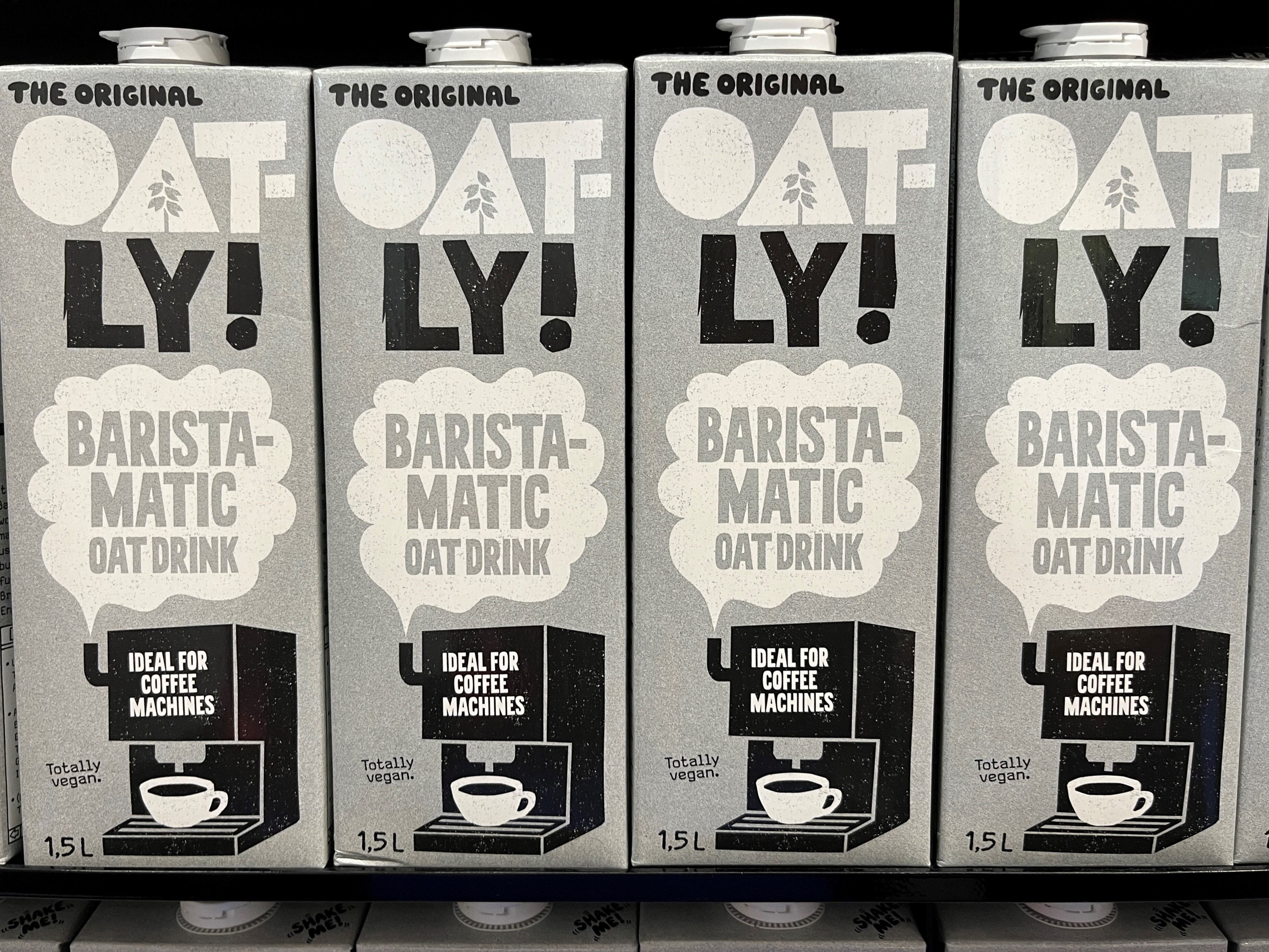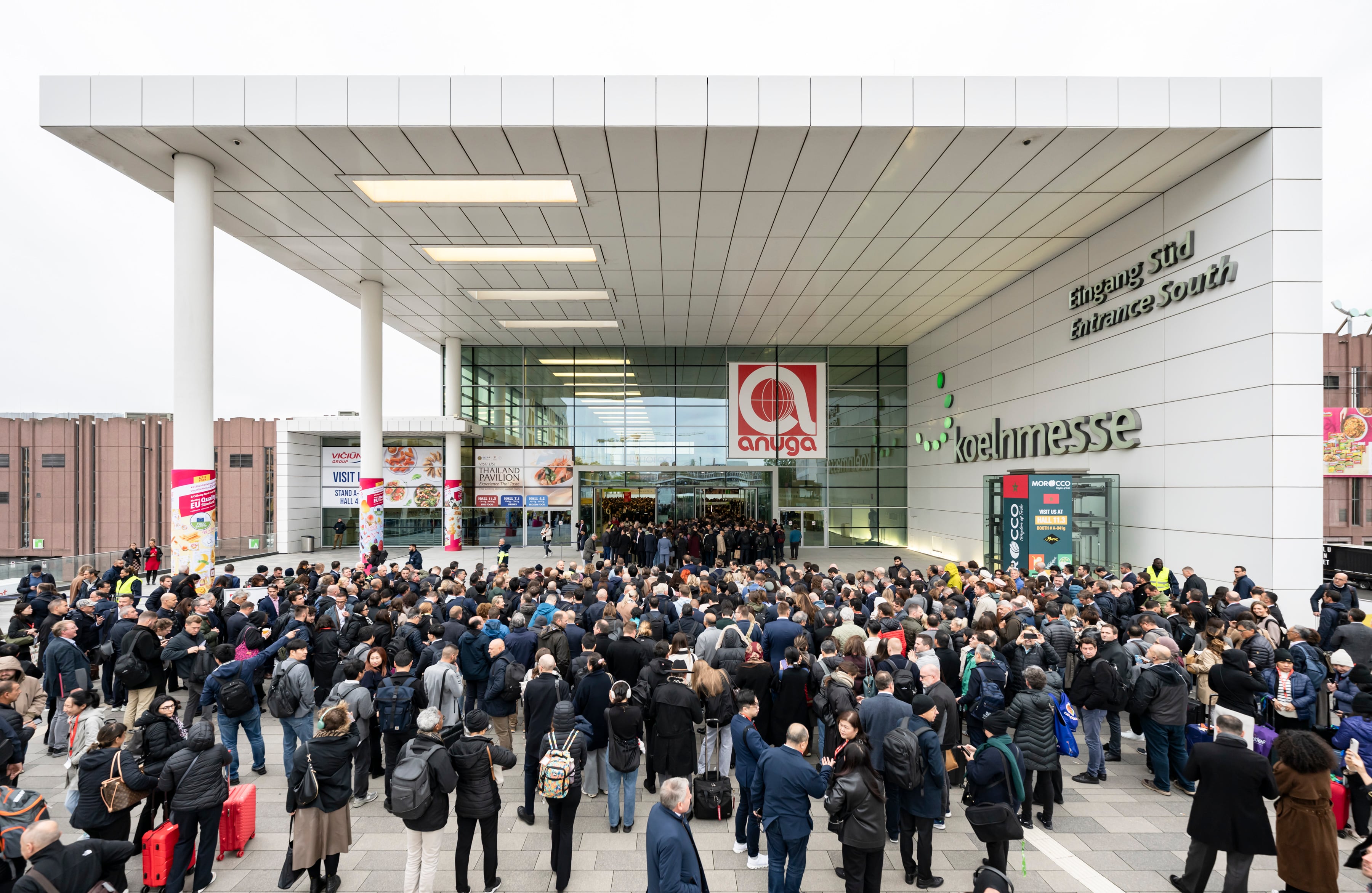Anuga 2025 was the first time the world’s largest food and beverage tradeshow had an exhibition hall dedicated to alternative protein innovation. But alt dairy products were spread out across many of the show’s exhibition halls and galleries, including Dairy and the Start-Up gallery. From hybrid meat to plant-based dairy, here’s what caught our eye . . .
Naturally fermented plant-based cheese alternatives
Plant-based cheese alternatives have traditionally relied on plant fats and starches to mimic dairy, but with taste and nutritional value continuing to be a challenge in the category, some companies have been taking a different approach: natural plant fermentation. Unlike precision fermentation – which involves programming microorganisms to produce dairy-identical proteins in a fermenter – natural fermentation is an age-old process used to produce yogurt, wine and a myriad of other foods. Italy’s Dreamfarm and the Netherlands’ WildWestLand are two companies that showcased plant-based dairy alternatives made through fermentation.
Dreamfarm’s Giovanni Menozzi told us it took the company two years of R&D and a year of waiting to patent their formulation before they finally went to market in 2023 with their first plant-based cheese products – which today fresh mozzarella, ricotta and stracciatella alternatives and a soft plant-based cheese spread, among others.
The company’s flagship product is a plant-based alternative to fresh mozzarella, which is made from locally-sourced almonds and cashews. That product’s nut base is naturally-fermented to achieve superior taste and functionality and a clean label that’s yielded a NutriScore of A. The product’s ingredients include vegetable fibers, salt, agar-agar, natural flavour, and lactic acid bacteria.
The price of Dreamfarm’s fresh mozzarella alternative is more than double that of traditional dairy mozzarella, however, at €3.49 RRP for the plant-based product versus €1.50 for the dairy product.
Are foodservice providers interested in stocking the fresh product? “It’s not super easy,” the company’s Giovanni Menozzi told us, “because you work with distributors who have thousands of products in a catalogue for restaurants to choose from. So you need to educate [foodservice providers], explain why this product is different, why it can cover several need states; and why when you go out for dinner with vegans, they may ‘condition’ the rest of the group to pick a vegan meal.”
For now, the brand is stocked in all major retail chains in Italy as well as Belgium, the Netherlands and Germany and is coming to Monoprix in France.

WildWestLand – a plant-based cheese company co-founded by Dutch precision fermentation dairy pioneers Those Vegan Cowboys – was showcasing its new Smeerkees cheese spreads. WildWestLand’s products include a Garlic & Herb spread, Melt Me Smoky alt cheese slices, and the two new cheese spreads, Smeerkees, launching in 2026 along with organic variants. Based on nutritional yeast, Smeerkees also include tapioca starch and some extra flavoring.
“We did blind tasting with consumers to find out if they’d like it, and they didn’t recognize these were plant-based,” said the company’s Marthe Commandeur. “A lot of consumers have a poor taste experience with plant-based cheese alternatives, so their first reaction here was that there was a lot of flavor and a smooth texture. We also focused on nutritional value too - these spreads have 30% less fat and salt.”
The new Smeerkees flavors are landing in the Netherlands in the new year, with the rest also launching in Canada, we were told. But back home, Dutch retailer Albert Heijn – which has launched its own private label range of hybrid and plant-based meat and dairy – has been a key supporter of the brand. “They are really happy with companies like us,” Commandeur said. “Companies that are focused on innovation, taste and quality.”
Clean-label milk alternatives
Consumer push-back against UPFs has impacted the plant-based milk market in recent years, with companies increasingly striving to formulate clean-label alternatives to stay ahead of the curve.
One such example was MamasChai, a low-sugar, low-calorie vegan alternative to chai latte. Made with black tea, spices and almond milk, the product is at home both as an RTD beverage (hot and cold) and as an ingredient for lattes, cocktails and baked goods, the company’s co-founder Leonie Ruhe told us at Anuga 2025.
Who are MamasChai’s main consumers? “Women, actually,” she said. “It’s women who want to be healthy, who care about their sugar intake and want to enjoy a plant-based drink but not consume too many calories or sugars.”
MamasChai also offers a liquid chai concentrates with real tea and spices for the foodservice industry. Locally produced in Amsterdam, the products are formulated as an alternative to chai powders and can be made into hot and cold drinks.
Other examples of clean-label alt dairy milks included The Bridge’s Bio Original Coconut drink (20% coconut water, spring water, sea salt and gellan gum as a stabilizer) and Orasi’s plant-based milks, available with added pea protein or fiber and no added sugar.
Hybrid meat from Meatless
Meatless served up a ‘hybrid tasting menu’ to showcase how a mix of real meat and a blend of alternative protein ingredients tastes like. Beef (70% meat), chicken (50%), sausage (60%) and fish (30%) alternatives were being cooked up on stand, with the company’s Oscar de Kuijer telling us that hybrid meat is not just lower-carbon alternative to traditional meat but it can also save foodservice providers money. Meatless uses mainly faba bean and rice-based ingredients depending on the application.
“Meat prices are sky high,” he said. “And consumers don’t always want to pay that premium and many want a cheaper alternative. This is why hybrid meat makes sense, and also from a sustainability perspective.”
Just how much of a difference to pricing there is vary per market, but even in big meat-eating countries like Argentina, there’s a price advantage, he told us.
And In Europe, some retailers such as Albert Heijn and the Colruyt Group are already selling hybrid meat, with products like mincemeat and burgers prime examples of how real meat and plant proteins can be integrated without much fuss.
Naturli enters the Dairy hall
While much of the alt dairy and meat companies were concentrated in the Alternatives hall, some were also exhibiting in the Dairy and Meat halls. Danish plant-based dairy company Naturli was among the few alt dairy firms showcasing its range of milk, butter, RTD protein drinks and ice cream alternatives in Hall 10. “It’s the place to be,” CEO Henrik Lund told us.
The company exhibited its new Barista-style plant-based milks along with butter alternatives for retail and foodservice and its range of ice cream (tubs and cones). “Our professional barista line, we sell exclusively to foodservice,” Lund said. “It was developed by Danish baristas so very taste-neutral for an oatmilk compared to what you’d normally find. But we reduced that because we wanted to make a product that complements the coffee flavor, not take it over. And then it also produces really tight foam.” Naturli also brought its flavored Barista lines for retail, including a Pumpkin Spice variant.
As for other formats, Naturli’s Organic Block butter alternative for baking is one of the company’s staple products. It’s made from a blend of coconut, shea butter and almond and rapeseed oil to deliver the functionality of dairy butter, we were told. “Our sales are growing because the price of butter has gone through the roof, and our product is cheaper,” Lund told us. “So this is a good butter alternative not just functionally but also in terms of price. It doesn’t leave a fatty taste in the mouth and melts down just like the dairy product,” he added. “We also sell it in sheets for lamination. A lot of bakeries are replacing butter with this, because they want that buttery note but also the right functionality in their production.”
The company also highlighted its high-protein shakes (24g of protein, no added sugar) made from a blend of oat, soy and amond and fortified with calcium, vitamins and fiber. Price is competitive, at €1.80 in Denmark, we were told.
Boermarke swaps dairy for plant-based
Dutch company Boermarke has been making dairy for decades – until it discovered that plant-based alternatives provided a better business model. The company sold its dairy operations in 2024 and has since focused on making private-label plant-based alternatives for some of Europe’s biggest retailers (including being the main supplier for Albert Heijn in the Netherlands) – including cheese, yogurt and ice cream alternatives. It also launched its own brand, Vairy.
But just like other players in plant-based, balancing consumer and retailer expectations is tricky. “Retailers ask for better taste, better nutrition, but they don’t necessarily want to pay for better nutrition; yet, if you have to deliver the goods, you have to absorb that cost.”
Revo Foods’ 3D-printed fish
Austrian start-up Revo Foods makes seafood alternatives from mycoprotein, a fungal protein that’s high in fiber and protein and low in fat. The company 3D-prints its products, saving time and resources and allowing for flexibility in terms of texture and formats, the company’s David Petuzzi told us at Anuga.
Revo Foods’ flagship product is The Fillet, a range of plain and flavored salmon alternatives made with Mycoprotein and microalgae oil and which contains omega-3, vitamins and essential amino acids. The company also presented El Blanco, a whitefish alternative, and The Kraken, an octopus alternative.
“The octopus is quite unique – it’s one of our latest products,” Petuzzi told us. “We sell in retail in Austria, Belgium, Denmark, France and other major European markets, and in the US through a joint venture with Juicy Marbles.”



